On April 25, the world turns its focus towards malaria, one of humanity’s oldest and deadliest diseases. Malaria disproportionately affects vulnerable populations, particularly women and children living in sub-Saharan Africa. Those living in poverty and in high-risk areas are also more susceptible to succumb to the disease due to limited resources and access to healthcare.
This year’s World Malaria Day theme “Gender, Health Equity and Human Rights” underscores the critical need to break this cycle of inequity to be able to achieve a zero-malaria world. In the past two decades, we have made great progress in the fight against malaria, with more than 7 million deaths averted. However, progress has stalled in recent years, particularly in high-burden countries in sub-Saharan Africa. Issues including those of growing resistance to antimalarial drugs and insecticides are undermining malaria control efforts. The looming threat of climate change threatens to worsen the situation by widening inequities.
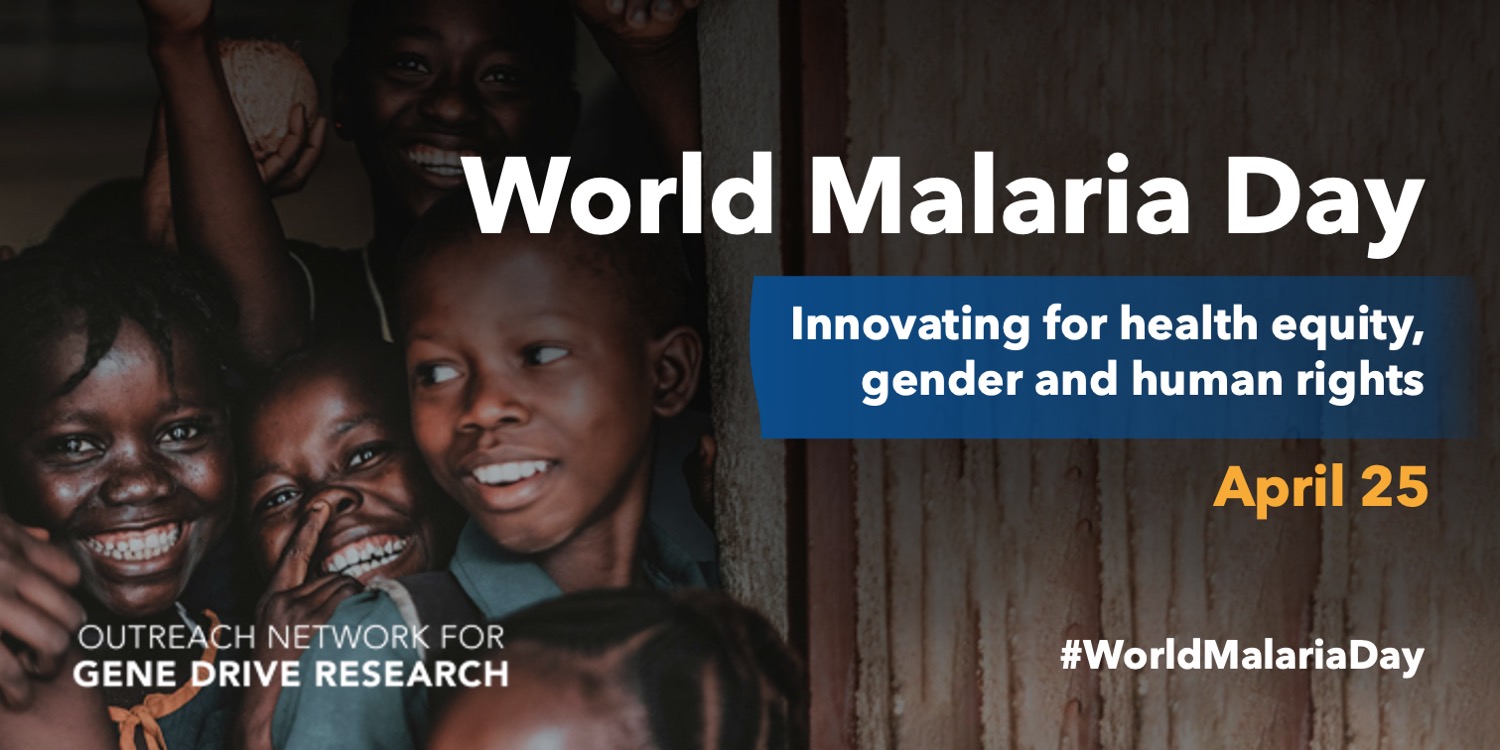
Nevertheless, eliminating malaria is still possible. More and more countries have been making malaria elimination a national priority. The declaration signed in March by African Ministers of Health, in Yaoundé, Cameroon, is a key step towards acknowledging the urgent need to alleviate the malaria burden in some of the countries that are hardest hit by the disease. Researchers worldwide are also working on innovative tools to address existing challenges and step up the fight against malaria.
This World Malaria Day, the Outreach Network for Gene Drive Research is highlighting the profiles of 12 researchers who are working on innovative approaches to accelerate the fight against malaria for a more equitable world.

Aayushi A. Sharma, Imperial College London, Transmission Zero
Malaria remains a significant threat worldwide, claiming the lives of over 600,000 people and infecting more than 249 million people each year. Vulnerable populations, especially women and children under the age of 5, bear the heaviest burden of malaria morbidity and mortality. Limited access to healthcare, particularly in remote areas where appropriate infrastructure and resources are lacking, adds further pressure to the fight against malaria. The emergence of insecticide and drug-resistant strains of the malaria parasite has also made control efforts in endemic countries significantly more challenging. As a result, there is an urgent need for novel approaches to aid in the fight against malaria. Gene drive technologies offer a promising avenue for malaria control. Through genetic engineering, we can introduce desirable modifications into mosquito vectors and hinder their ability to transmit malaria parasites. Transmission Zero, a global malaria research programme led by scientists at Imperial College London and the Ifakara Health Institute, is developing genetic tools to reduce malaria transmission. My current research is focused on characterizing the different mechanisms via which we can block malaria transmission, addressing questions which will help inform the potential implementation of these genetic technologies going forward.
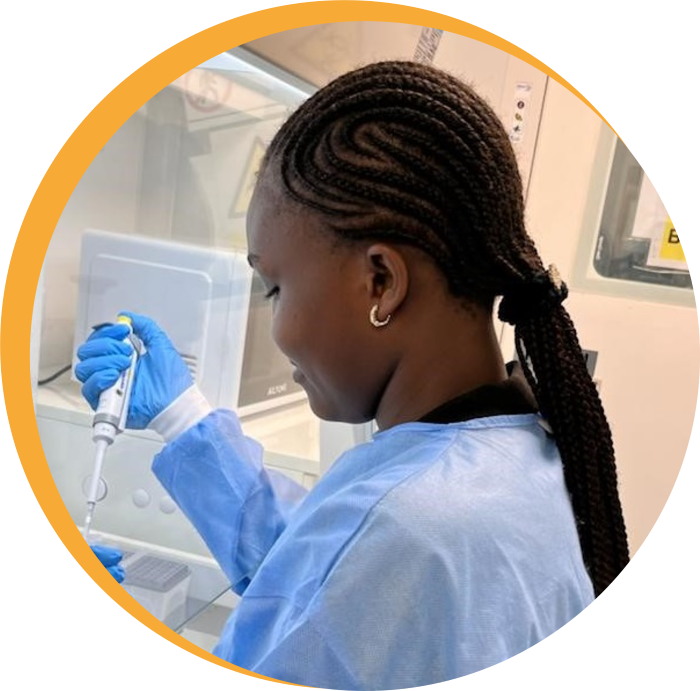
Rehema Mwanga, Ifakara Health Institute, Transmission Zero
Malaria remains a significant public health challenge in tropical and subtropical regions, where it disproportionately impacts women and children. Access to essential healthcare services remains a pressing concern in these areas, with many struggling to either afford treatment or reach medical facilities. The fight against malaria is also threatened by emerging resistance of the malaria mosquitoes and the parasite they carry to available interventions. Because of this, it is important that we explore the development of new tools for malaria control. As a Research Officer at the Ifakara Health Institute, I contribute to a project called Transmission Zero. We are working to develop a new tool to help stop malaria transmission, by genetically modifying mosquitoes so they are unable to transmit the malaria parasite. Advancements such as gene drive mosquitoes hold promise for fostering health equity, particularly benefitting communities most burdened by malaria in Africa.

Diane Kama, Institut de Recherche en Sciences de la Santé (IRSS), Target Malaria
Malaria is a major public health issue in Burkina Faso, where it accounts for over 30% of deaths. It is a leading cause of illness, which disproportionally affects women and children. In our community, women are affected both directly and indirectly by the disease, through falling sick or having to provide care to sick family members, which diverts time away from their daily activities. The strain malaria places on communities is exacerbated by other obstacles, such as inadequate infrastructure and insufficient resources to fight the disease effectively. Emerging threats such as increasing resistance to antimalarial drugs and insecticides are compounding these difficulties. In the face of these challenges, new effective, affordable and accessible tools are needed. Gene drive technologies offer promise as they could help reduce the population of mosquitoes that carry malaria and thus help reduce malaria transmission. As Quality Assurance Officer, I work on the design, development, implementation and maintenance of the quality management system for Target Malaria in Burkina Faso. The aim is to define a framework that could help us achieve the project’s objective to develop an innovative approach to stop malaria transmission.

Ivan Mulongo Mugeni, University of California Malaria Initiative (UCMI)
Growing up, I struggled to understand how an animal as small as a mosquito could cause such immense grief. Stories of pregnant women and young children losing their lives to malaria were common. Malaria often kept me from school and my friends bedridden. Most of my mother’s modest earnings from her village’s grocery store went towards treating me and my siblings. Each round of the disease hit with equal ferocity. Malaria, primarily impacting women and children, not only devastates families but also hinders countries’ economic progress. That’s why aiming for zero malaria is critical to protect every mother and child vulnerable to this deadly disease. As an area-wide intervention, gene drive technologies could help promote health equity, offering protection to the most vulnerable and ensuring that the strides we make in combating malaria benefit everyone, especially those most at risk. In my role as an insectary assistant at UCMI, I study the biology of Anopheles mosquitoes. This research is key to advance UCMI’s work to develop gene drive mosquitoes that could prevent malaria transmission.

Felista Tarimo, Ifakara Health Institute, Transmission Zero
Malaria, often labeled as a “disease of poverty,” persists as endemic in most Sub-Saharan African countries. This is due to various factors, including favorable climate and environmental conditions for malaria vectors, coupled with population growth and limited resources. Across much of this region, men are usually the primary financial providers, while women mostly take on caregiving roles within families. Because of this, when a family member falls ill with malaria, women shoulder a heavier burden, and are unable to engage in their usual socio-economic activities. To sustain and enhance efforts in the battle against malaria, prioritizing research and innovation is important. This allows us to firstly, pinpoint any gaps in the reach of existing interventions, and secondly, to proactively develop innovative technologies. At Transmission Zero, Ifakara Health Institute, our goal is to develop a novel tool that could complement existing interventions and help achieve malaria elimination in Africa. Gene drives are one of the tools that hold great promise in malaria elimination. If proven safe and effective, these technologies could help transcend geographical boundaries, socio-economic status, and gender disparity, and make a significant contribution to promoting health equity in the fight against malaria. My role at Transmission Zero involves engaging with stakeholders to understand their perspectives, needs, and concerns, and facilitate open dialogue and information sharing. Through engagement, we make sure that different stakeholder groups are aware and informed of our project activities, acknowledging that we are collectively striving towards the common objective of eliminating malaria.
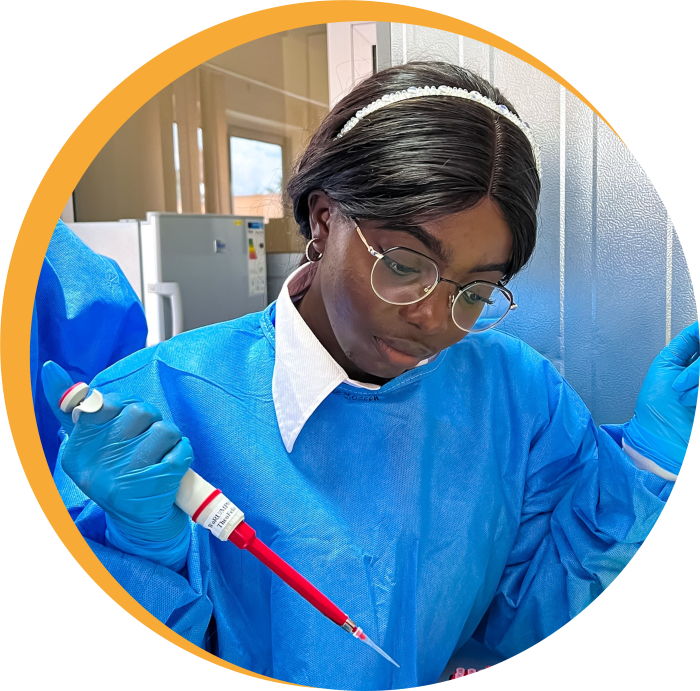
Rosalia Joseph, Women in Vector Control, Pan-African Mosquito Control Association (PAMCA)
Malaria’s toll on women and children is exacerbated by societal and gender constructs that are not inclusive. Tackling these challenges goes beyond medical issues, as power dynamics and socioeconomic factors create barriers that hinder effective implementation of malaria control interventions. While conventional methods have made progress, there is no one silver bullet in the fight against malaria, meaning that continuous research and innovation are needed. Novel approaches such as gene drive technologies offer promise in accelerating malaria elimination and reducing disease exposure. These technologies could for example help reduce malaria transmission by efficiently spreading disease-resistant genes throughout mosquito populations. To contribute to the pool of innovators, researchers and leaders working to fight vector-borne diseases (VBDs), PAMCA’s Women in Vector Control (WiVC) initiative is aiming to build a critical mass of African women with capability to address health challenges, promote global health equity, and contribute to the development of innovative tools such as gene drive. As a WiVC regional coordinator, I’m involved in building the capacity of women in the field of VBDs, including malaria. My doctoral research also focuses on exploring the impact of gender dynamics on malaria exposure. By understanding how gender influences vulnerability to malaria, my research aims to uncover hidden disparities and inform targeted interventions that address the social and structural factors driving malaria risk.
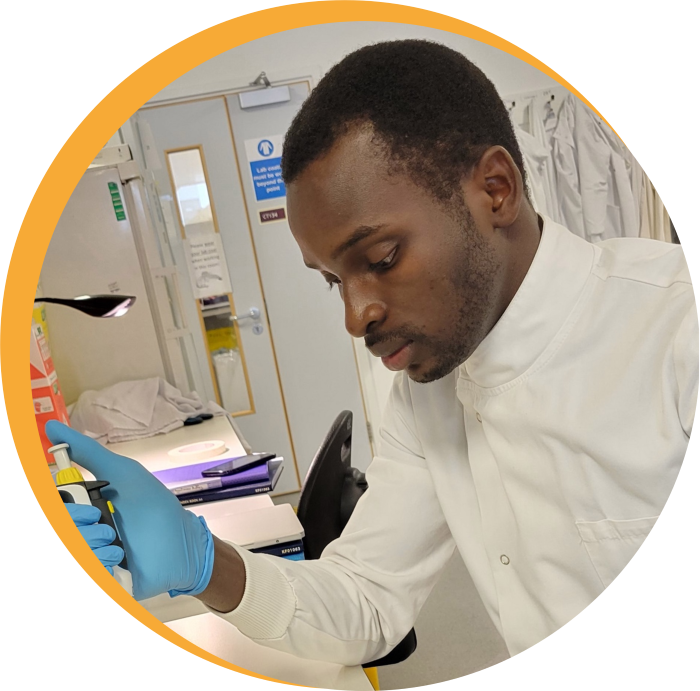
Sabere Oliver Gilles Yemien, Institut de Recherche en Sciences de la Santé (IRSS)
Malaria remains a significant public health threat, particularly in Africa. In Burkina Faso alone, malaria affected over 8 million people in 2022. In many African countries, over 75% of malaria-related deaths occur in children under 5 years of age. This stark reality and growing challenges in the fight against the disease underscore the urgent need to develop new and more effective approaches to achieve malaria elimination. In Burkina Faso, as in many other low-income countries where access to healthcare is a challenge, especially in rural areas, new vector control tools such as gene drive technology offer promise. Because they rely on the mosquito itself to do the work, gene drive technologies could help overcome barriers to healthcare access and ensure all communities, regardless of geographical location and socioeconomic status, are reached. Exploring new tools like gene drive technology necessitates the involvement of African scientists and local partners in countries which are most affected by malaria. As part of a capacity-building project funded by the Bill & Melinda Gates Foundation in collaboration with the Liverpool School of Tropical Medicine and the Institut de Recherche en Sciences de la Santé (IRSS) in Burkina Faso, I am currently studying gene drive approaches targeting blood meal metabolism in the malaria vector Anopheles funestus.
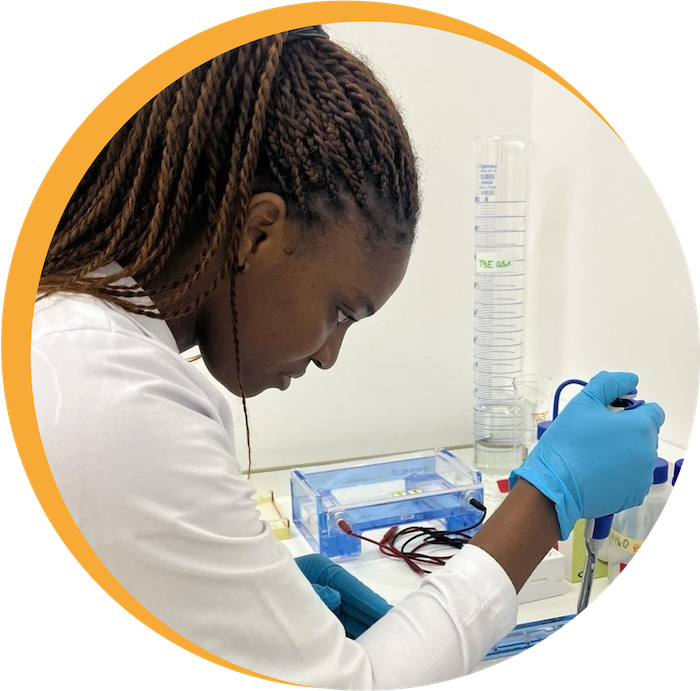
Janete Marbel Lopes, Laboratory Technician, University of California Malaria Initiative (UCMI)
Malaria predominantly affects populations in tropical and subtropical regions, particularly children under 5 and pregnant women. Communities affected by malaria face many challenges, ranging from inadequate access to healthcare services to issues of growing resistance to available tools, such as antimalarial drugs and insecticides. Climate change, which creates environmental conditions favorable to the proliferation of the malaria mosquito is further exacerbating the situation, adding to the existing challenges stemming from poverty and inequality. Research and innovation can contribute to overcoming these challenges and lead to the development of new promising strategies and tools to control malaria, such as genetically modified mosquitoes. Since 2022, I have been working as a laboratory technician at the Molecular Biology Laboratory of the University of California Malaria Initiative (UCMI), in São Tomé and Príncipe (STP). The laboratory, located at the University of STP, provides support to UCMI’s ongoing field research on mosquito vectors, and supports training of students from the University. My research supports UCMI’s work to develop gene drive mosquitoes that are unable to transmit malaria and that could one day be used as an additional tool to help achieve malaria elimination in STP.
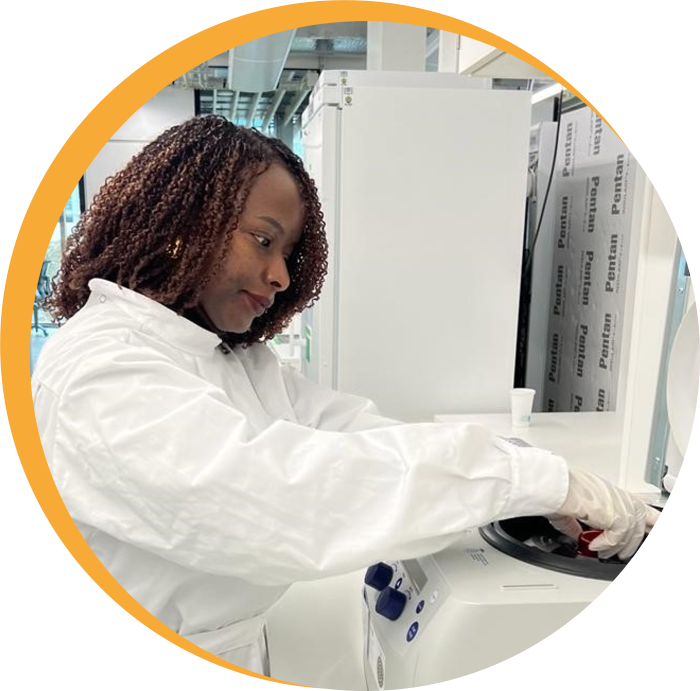
Karen Nelwin, National Institute for Medical Research, Transmission Zero
Mosquitoes serve as carriers of pathogens responsible for widespread human diseases like malaria. In Tanzania, malaria poses a significant and enduring threat, particularly impacting vulnerable groups such as women and children, and greatly affecting their health and overall well-being. As an entomologist at the National Institute for Medical Research and a collaborator with Transmission Zero at Ifakara Health Institute in Tanzania, my research aims to contribute to the development of sustainable and equitable malaria interventions. I am currently working on a technique that could be integrated into mosquito surveillance and control programs called Nanopore sequencing. This technology helps to detect mosquitoes and pathogens retrieved from monitoring traps. This is particularly crucial in regions like Tanzania, where there is a shortage of rapid and cost-effective tools for vector surveillance and control. To step up the fight against malaria, we need to explore all tools at our disposal. Central to this effort are research and innovation, which play a pivotal role in devising effective strategies to combat malaria and promote health equity. Collaborations with local communities and healthcare organizations are also crucial to facilitate the translation of scientific findings into practical solutions and to empower vulnerable communities which are disproportionately affected by the disease.

Andrea (Andie) Smidler, The Akbari Lab, University of California San Diego (UCSD)
Women and children are disproportionately affected by malaria. Women are more prone to a particularly deadly form of malaria when pregnant, while children are more vulnerable to the disease due to a lack of acquired immunity. Women also bear the economic brunt of this ancient disease, as it usually falls upon them to care for sick family members, which can take a toll on their education and career prospects. My work at the University of California San Diego is focused on developing new genetic technologies which could help control the African malaria mosquito, Anopheles gambiae. Most available interventions to control malaria target indoor nighttime biting, leaving communities unprotected from outdoor and daytime biting mosquito populations. As they are an area-wide intervention, gene drive technologies could help target mosquitoes indoors, outdoors, and everywhere in their range – potentially helping to protect entire communities from malaria, regardless of their geographical location or individual behavior. Eliminating childhood mortality due to malaria is critical as it could help lift not just families but entire communities out of poverty. That is why I have dedicated my career towards developing novel tools that could help target malaria at the source. Knowing that my work could one day contribute to eliminating malaria is incredibly fulfilling.
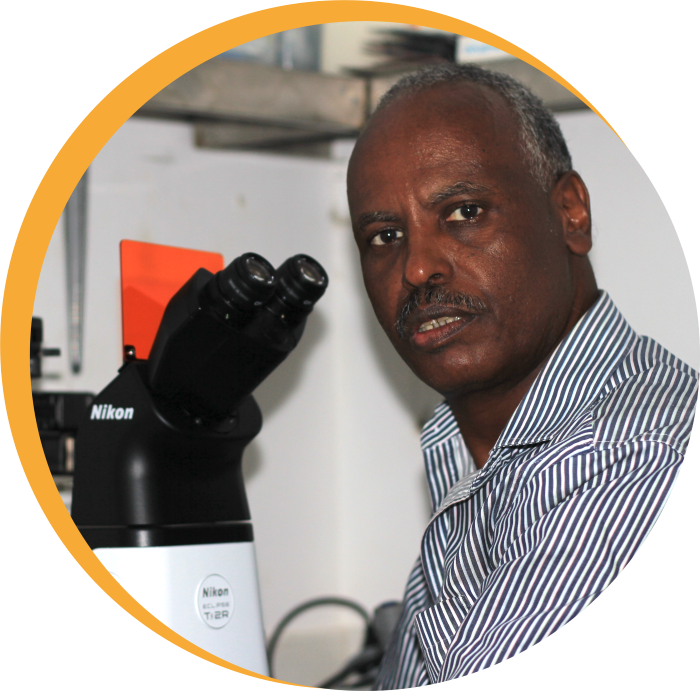
Tibebu Habtewold, Imperial College London/ Ifakara Health Institute, Transmission Zero
Malaria continues to disproportionately affect women and children in sub-Saharan Africa, where limited access to healthcare services exacerbates the suffering caused by this disease. The burden is compounded by issues of limited resources and equity, making the fight against malaria not only a medical challenge but also a socio-economic one. Research and innovation are urgently needed to level the playing field, ensure health equity, and turn the tide against malaria. Novel tools, such as gene drive technologies, have the potential to reduce the transmission of malaria in a way that is both sustainable and equitable. By blocking the transmission of the parasite at its source, this approach could offer a long-term, cost-effective solution that benefits all members of affected communities equally. My work focuses on integrating anti-plasmodium molecules that can halt the spread of malaria into mosquito genomes. I am also dedicated to building the capacity of researchers at the Ifakara Health Institute to enable teams on site to conduct analysis and evaluation of genetically modified mosquitoes in the laboratory. Developing scalable and equitable malaria-control tools and strategies is crucial to help uplift the health and prosperity of communities in sub-Saharan Africa.

Patience Arinaitwe, Uganda Virus Research Institute, Target Malaria
Malaria continues to exert a toll on vulnerable populations, particularly women and children below five years of age living in sub-Saharan Africa. Uganda, where I live and work, is hardly hit by the disease, with over 90% of the population at risk. Local communities, especially those in rural areas, face several challenges in the fight against malaria, such as limited access to healthcare services or limited finances, which can make it difficult to obtain proper diagnosis and treatment. To make matters worse, the emergence of drug resistance is rendering existing tools like insecticide spray, mosquito nets, and antimalarial drugs less effective, highlighting the urgent need to develop new interventions. As a Stakeholder Engagement Officer with Target Malaria in Uganda, I work to engage local communities about malaria. My colleagues and I regularly visit communities, some in hard-to-reach areas. We educate them on prevention methods using currently available tools and share information on Target Malaria’s work to develop new genetic technologies for the fight against malaria. Community and stakeholder engagement is crucial. It allows us to gather vital information to address gaps in our knowledge about malaria and to inform our research work. Through continuous engagement, we build stronger relationships and collaboration with communities in the fight against malaria.
